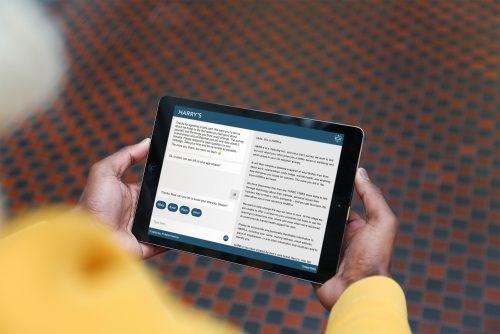Ai and the secret life of men
Date: Friday 05 Jul 2019
Written by Pete Trainor, Co-founder, Us Ai
The latest Harry’s masculinity report contains startling findings about what it means to be a man in the UK in 2019.
Its data has been collected by a bot deployed by the London based ‘intelligently artificial’ studio Us Ai. Co-founder Pete Trainor says machines used wisely can guide us to a more positive future.
Seven billion people are walking this planet, technology has made us more connected than ever – but are we in the midst of an epidemic of loneliness? According to a study powered by a bot from Us Ai, that could well be the case – at least among men.
In a groundbreaking piece of research conducted by Us Ai on behalf of men’s grooming brand Harry’s, it was deployed to speak with men across the UK freely, and anonymously about what keeps them awake at night, what they worry about, what makes them feel lonely, as well as attitudes to masculinity, wellbeing (by a different label) and happiness. The results, published in December 2018, have been startling.
As journalist and Harry’s ambassador, Martin Daubney reported, “with 59% of respondents suggesting they’d like to talk further to a bot about their mental health, Ai-powered services could be the key to unlocking men, historically that most stubborn of demographics, and build a bridge into the real-world care network.''
“Rather than patronisingly insist men ‘talk more’, then blame them when they don’t, it has shown that perhaps it’s time to change how – and where – we listen to men. Rather than expect men to self-present at their GPs and talk face to face, perhaps we need to take the conversation to them, via technology we know they are already comfortable with,” he concluded.''
While many men who spoke with the bot had never spoken to a person about their issues because they found it too invasive, when they spoke with it now, they had plenty to say.
In fact, more than 2,000 men between the ages of 18 and 88 came forward and responded, safe in the knowledge they weren’t being judged, and that they were contributing to something potentially profound. Participants included builders, designers, company directors, doctors, teachers and barristers. Their replies were in parts heartfelt, sad, angry and bewildered.
The study has unearthed ramifications about the distance between where some men in the UK are, and where they want to be to add value to society. In some cases, it’s a gulf to cross. Less connection – the real kind – means that some men aren’t able to build relationships as strong as they could be, nor are they able to maintain them as well as they need too.
That’s not to suggest they’re a lost cause; far from it. What has become apparent through the study is just how much hope for change is present in society if we can use technology to broker a better space to communicate.
We were looking almost exclusively at the sentiment and themes in what people were saying. We have no desire at all to exploit people’s fears or weaknesses with this tech, just help change the narrative around the topics that lead to mental health complications. To give people coping strategies for surviving the changes of an ever-changing world.
(Harry's bot)

What also emerged in the findings is that, despite many people being in relationships, and having broad friendship groups and networks, they still feel lonely. Men who said they were single went on to have much lower life satisfaction scores (across all ages and demographics) than the men who told the bot they were married or in a relationship.
That is troubling, to say the least. Even the NHS acknowledges that people who experience loneliness for prolonged periods of time show health impacts that may be as significant as smoking every day or being obese. Then there is, of course, the direct link between loneliness and poor mental health.
Further probing of the data also validated that loneliness isn’t just associated with being alone. Many of the most tragic comments that the bot received came from men who appear to be surrounded by others, married and often well-connected socially.
It seems what we’re looking at is a problem with quality rather than the number of relationships that people have. A person may have many friends but still find that their needs for social contact are not met.
I don’t see Ai being able to solve that per se, but I do see it playing a role in helping people make sense of it. It’s about doing better things, not things better, and by that we mean we’ve got technology pouring out of every pore now. Social media isn’t the answer, because it doesn’t make us more sociable. So machines that can start to understand us, and guide us towards positive outcomes feels like the only way we can move forward.
The good news is, we now have the technology to gather the proof points we need to show what kind of interventions might be ‘needed’.
Whilst the crisis among men and women is showing no signs of going away, and negative technology is not about to move aside. It seems that studies such as this one might help change the narrative about what needs to be done to support is better. We’ve inserted so much technology between people, it’s now easier to communicate through the screen, than face-to-face. Which is tragic, but also a reality which we must be able to use to our advantage, And as the technology matures and hardens, it equips society with better tools to reach the most vulnerable amongst us.
First published on 4th December 2018.
(Pete Trainor talking about the use of data, Ai and suicide prevention)

